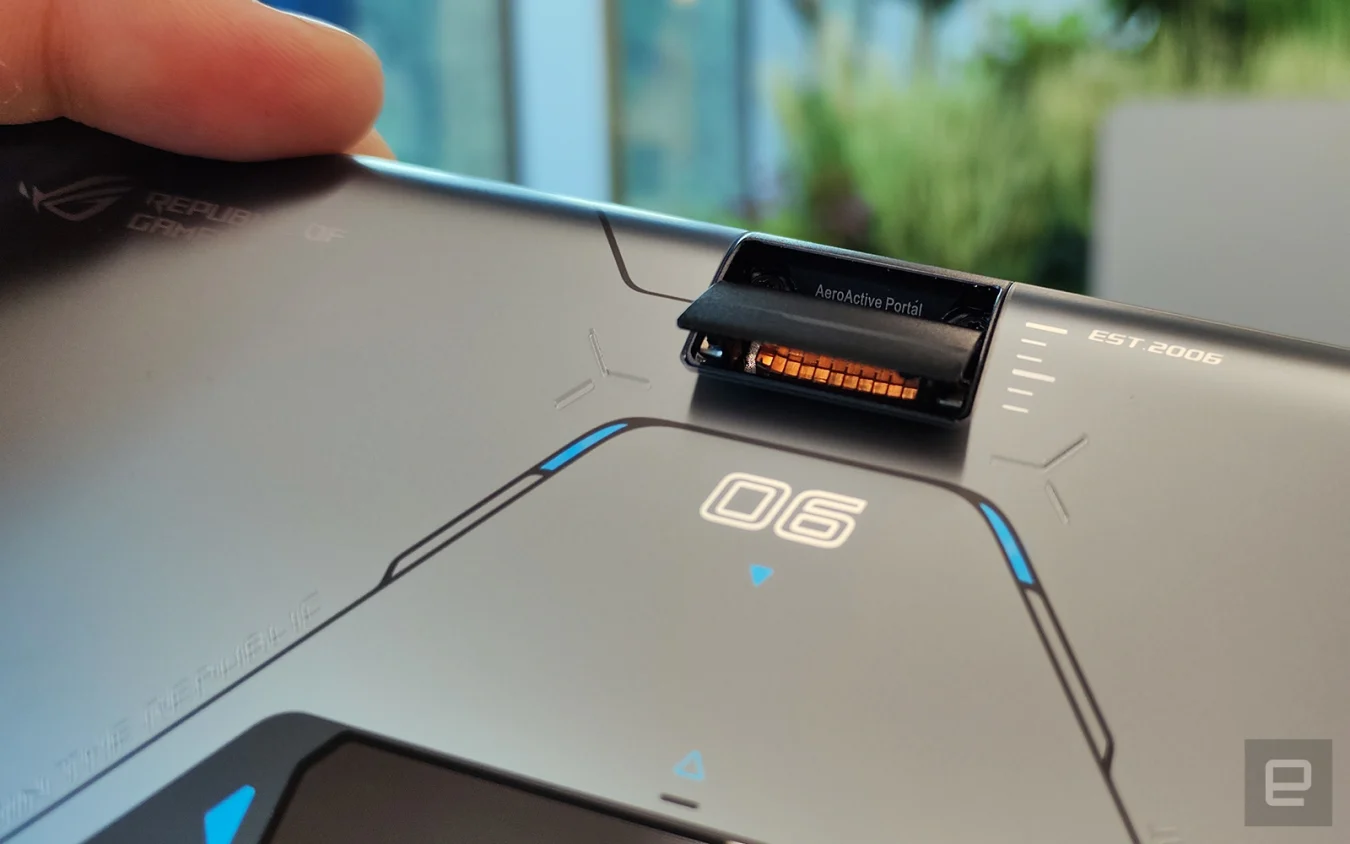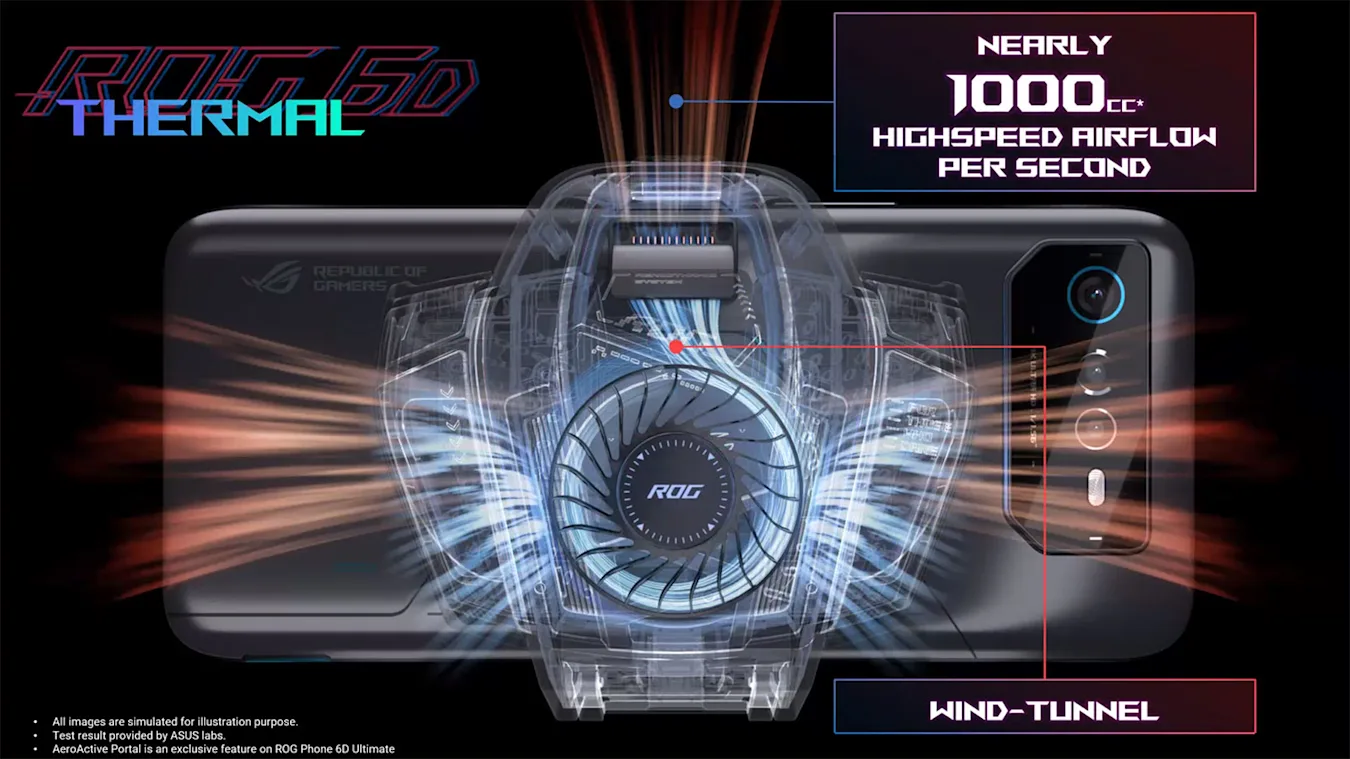After the launch of the ROG Phone 6 Pro gaming phone, some hardcore fans were left wondering what happened to the “Ultimate” variant. As it turns out, ASUS waited for over two months before unveiling its “one more thing”: the ROG Phone 6D Ultimate. It’s identical to the 6 Pro in almost every way, except for four things: the new “space gray” color, the interesting choice of the MediaTek Dimensity 9000+ processor (which is what the “D” in “6D” stands for), the switch to the faster LPDDR5X RAM, and the new “AeroActive Portal” design for blowing cool air into its internal heat-dissipation fins — I’ll abbreviate this as heatsink from here onwards.
The AeroActive Portal itself is essentially a door flap that opens when the bundled AeroActive Cooler 6 is attached, so that a portion of the cool wind produced by the fan — at nearly 1,000cc per second — is guided through a wind tunnel and into the heatsink, with hot air coming out from the top slot. The heatsink is, of course, linked to the generously sized thermal layers covering the logic board and battery cells, in order to transfer heat from the components to the airflow. This is to help sustain a high frame rate over a longer period while gaming, as well as to ensure the phone is still comfortable to hold.

Richard Lai/Engadget
ASUS claimed that after 60 minutes of Perfdog benchmarking on Genshin Impact at 60Hz in air cooling mode, the ROG Phone 6D reached 36.9°C (98.42°F), which was 3.4°C lower than the ROG Phone 6 in the same mode. That is to say, the AeroActive Portal seems to make a notable difference. Likewise in “Frosty” and “Frozen” modes (with the Peltier thermoelectric cooling chip enabled), and it’s worth repeating that the AeroActive Cooler 6 is the only Peltier-enabled cooler in the market that doesn’t require additional power externally — it only needs that for the more powerful “Frozen” mode.
While the AeroActive Portal only kicks in when an AeroActive Cooler 6 is attached, you can open it temporarily in settings for cleaning purposes. The flap is otherwise shut tight to safeguard the phone’s IPX4 splash resistance. It also has fall detection for automatically retracting the flap, and the stepping motor along with the zirconium alloy hinge are apparently good for over 40,000 flips — both of which are based on the learnings from the now-retired Flip Camera feature from the Zenfone series.

ASUS
The 6D Ultimate packs the same set of key features as the 6 Pro: 165Hz 6.78-inch AMOLED display, 720Hz touch sampling rate, up to 512GB of storage, 6,000mAh battery, 65W fast charging (42 minutes), Dirac-tuned front-facing stereo speakers, ultrasonic “AirTiggers” and a customizable “ROG Vision” color display on the back. It’s also the same set of cameras: a 50-megapixel main camera with Sony’s IMX766 sensor, a 13-megapixel ultra-wide camera plus a 5-megapixel macro camera; and on the front, there’s a 12-megapixel selfie camera with a Sony IMX663 sensor.
For the processor, ASUS made the surprise switch to MediaTek for its Dimensity 9000+ processor, which apparently scores a tad higher than the ROG Phone 6’s Qualcomm Snapdragon 8+ Gen 1. The company added that while the Snapdragon flagship chipset packs a better GPU, the Dimensity’s CPU is allegedly 10 percent more powerful (albeit with the same 3.2GHz maximum clock speed), and this is more crucial to most mobile games. The CPU is complemented by the faster LPDDR5X RAM as well, though this is the same reason as to why this is capped at 16GB instead of 18GB here.

ASUS
The ROG Phone 6D Ultimate will be available across Europe very soon, with the sole model (16GB RAM with 512GB storage) priced at €1,399 (around $1,400) or £1,199. Again, this premium model comes bundled with an AeroActive Cooler 6. There’s also the ROG Phone 6D launching alongside, which is basically the ROG Phone 6 but packing MediaTek’s chipset and LPDDR5X RAM instead (also, it’s just an RGB logo instead of an ROG Vision screen on the back; and no AeroActive Portal, of course). This starts from €949 (around $950) or £799 with the 12GB RAM plus 256GB storage base model.
All products recommended by Engadget are selected by our editorial team, independent of our parent company. Some of our stories include affiliate links. If you buy something through one of these links, we may earn an affiliate commission. All prices are correct at the time of publishing.